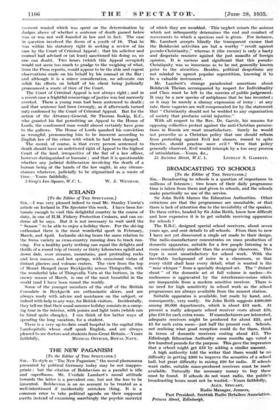THE NEW PAGANISM
[To the Editor of THE SPECTATOR.] SIR,—To style as " The. New Paganism" the moral phenomena presented by political Germany today may be not inappro- priate ; but the citation of Bolshevism as a parallel is idle and superfluous. Mr. Uvedale Lambert's moral attitude towards the latter is a prevalent .one, but not the less to be lamented. Bolshevism is on no account to be treated as a well-intentioned if incidentally mistaken thing. It is a common error to take political agenda on their supposed merits instead of examining searchingly the psychic materiel of which they are moulded. - This!neglect .misses. the animus which not infrequently determines the end and ,conduct of
movements to which a specious cast is given. For instance, Mr. Lambert accepts blindly the transparent excuse that the Bolshevist activities are but a worthy " revolt against pseudo-Christianity," whereas it (the excuse) is only a hasty and despeiate resource against --the just assaults of -foreign opinion. It was curious and significant that this pseudo- Christianity was so innocuous as to be not generallyknown prior to the atrocities. Besides, political despotisms are not minded to uproot popular superstition, biowini it to be- a valuable instrument.
Mr. Lambert's • strange paradoxical assertions about Bolshevik' Theism accompanied by respect for 'Individuality and Class must be left to the mercies of public judgement. It may be a new species of antiphrase that he has invented ; or it may be merely a clumsy expression of irony : at any rate, these vagaries are well compensated for by the statement that " Christianity should not be wedded- to any organization . , of society that produces social injustice."
With all respect to the Rev. Dr. Garvie, his reasons for opposing collective protest against the anti-Christian persecu- tions in Russia are most unsatisfactory. Surely he would not prescribe as a Christian policy that one should refrain from protesting against Evil lest sinners, roused to spite therefor, should practise more evil ? Were that policy generally observed, Evil would triumph by a too easy process of intimidation.—Yours, &c.,






































 Previous page
Previous page